Past presidents and a founder of Ethos: Dominique Hazzard ’12, Shukri Abdi ’01, Debby Saintil Previna ’96, Alyce Jones Lee ’81, Jill Willis ’73, and Francille Rusan Wilson ’69.
When Francille Rusan Wilson ’69 arrived on campus in the fall of 1965, she was one of six black freshmen. To say the least, “it was not very diverse,” Wilson says. The six students quickly realized that the College had paired four of them in double rooms. One had requested a single, and Wilson, who was unknowingly part of an “experiment,” was placed with a white roommate, with that student’s parents’ prior approval. “We were concerned about this residential segregation. We talked about it amongst ourselves, and individually, we tried to address it with the administration, to no avail,” Wilson remembers.
In December 1966, Wilson and a small group of like-minded students traveled to New York to attend a black-student conference at Columbia University. A fire was lit. A small cohort of determined women—Wilson, Nancy Gist ’69, Yvonne Smith Madlock ’70, Alvia Wardlaw ’69, Karen Williamson ’69, and others—pledged to confront racism on campus, and Ethos was born. After very public battles with President Ruth Adams’s administration, Ethos effected many important changes: The racist rooming policy ended, the College pushed to admit more black students to the class of ’73 (57 black students entered in 1969), Harambee House was established as a home for students of African descent, and black studies became an interdepartmental major.
As Ethos celebrates its 50th anniversary this year, we spoke with Wilson and five past presidents of Ethos through the decades about what the organization meant to them. While the times change—students went from demonstrating in the Civil Rights movement to pushing the College to divest from South Africa to marching for the Black Lives Matter movement—the need for Ethos has not diminished. Alumnae speak of the relief that came from having Harambee House, a space where they could relax and be with people who understood them, where they didn’t have to explain anything. They all also express gratitude toward the black alumnae who came before them, and hope for those who follow.
“When you have the backing of all the ancestors, you know you’re unstoppable,” says Shukri Abdi ’01, an Ethos past president.
Timothy Archibald
Francille Rusan Wilson ’69
One of the Ethos founders
There were six black freshmen in my class in the fall of 1965. And for many of us six, [coming to Wellesley] was a shock. All but one of us came from the South, which had only recently been desegregated. We really thought that Massachusetts was a very liberal state. It’s why we came in the first place. But we got disabused of that pretty quickly. Campus was mostly OK, but when we walked into town, we got racist taunts—including the N-word—from people in town.
In the winter of 1966, we went to a conference at Columbia University. [The conference addressed life for black students on predominantly white campuses.] There were about 300 students from about 30 schools who had gathered to discuss life on these campuses, the need for more—or any—black faculty and administrators, etc.
On the way back to Wellesley, we decided we needed an organization to address some of the same issues we’d heard at the conference. We felt we’d have a stronger voice with the administration if we approached them collectively. So when we came back, we talked to other black students, and they agreed.
Somewhere between December ’66 and January ’67, Ethos was formed. Why the name Ethos? We were trying to think of something that expressed our spirit and sisterhood. Somehow “ethos” came up. We looked up what it meant, and one of the definitions was “the pervasive character that distinguishes a group or culture.”
Everyone agreed Ethos was the word. We felt we were a sisterhood, and our new name seemed to reflect how we felt at the time.
There were questions about why we couldn’t just be open to everyone, and we tried to explain that black students needed a place where they could freely talk about things that affected them as black students. Eventually that was resolved. Ethos sponsored many events—lectures, music and dance programs, etc.—that were open to the entire College. We wanted them to come! And they did. But the organization remained an organization for black women. Women of African descent.
We needed to have more black student applicants, and pretty quickly we began to talk about a black-studies major. In fact, Wellesley was one of the first Ivy/Seven Sisters colleges to vote for African-American studies.
I feel like Ethos is a place where black women get leadership skills, as well as find a space and place to be. In many important ways, Wellesley today is a very different place from the Wellesley I came to my freshman year. And, by the way, I am thrilled to death about President Johnson!
What do I hope? I hope Ethos continues to grow in spirit and adapt to the changes of the 21st century. I hope Ethos members will continue to be activists in ways that make sense to them. I hope the College will continue to support black women, and welcome students of African descent.
A lot of black students’ organizations that were founded around the same time Ethos was have disintegrated, or been merged with other organizations. I’m proud that Ethos still exists, and I hope in future years, subsequent classes of black women will keep it going.
—Interview by Karen Grigsby Bates ’73
An intellectual and labor historian at the University of Southern California, Francille Rusan Wilson ’69 is spending a sabbatical year at Stanford’s Center for Advanced Study in the Behavioral Sciences.
Saverio Truglia
Jill Willis ’73
President of Ethos, 1972–73
This is my 45th year out of Wellesley. When I arrived on the campus in 1969, it was a very different time.
One of the biggest things I can remember [when I first arrived on campus is] the marching outside of Wellesley protesting the Vietnam War. There [were] crowds of people.
I remember signing petitions against the Vietnam War, and I have in my scrapbook a letter on White House stationery, acknowledging receipt of my protest of the Vietnam War. My older brother fought in Vietnam. My sister’s first boyfriend in high school went to Vietnam and didn’t come back. I remember what that was like for us, not knowing.
I came on the cusp of the Civil Rights movement, and I only learned when I got to campus about all of the protests that had gone on about increasing enrollment of black students and creating an African-American history curriculum.
We were, the class of ’73, the largest class of black enrolled students that Wellesley had had. We felt that we were helping the campus come into the real world, a world that was diverse, with people who didn’t look like all the people in Fairfield, Conn. Wellesley gained by encouraging the exchange of ideas and different types of discussions you can have when you have a diverse environment.
There was some feeling among white students that we were sort of separatists, that we had more than we deserved on the campus, given the numbers of us that were there. Why did we deserve the house and the budget? I think one year we got money to bring Earth, Wind & Fire on campus. You know, so Ethos had a budget.
But the idea of there being this bright yellow-colored house that was for black students was very attractive to some of us who came from environments where feeling comfortable surrounded in a predominantly white environment was challenging. You know, a place that you can come and just sort of relax and chat and eat and plan activities, and the choir and dancers would rehearse there. It was comforting to be around people that I didn’t have to explain a lot to. It was a respite for us. Ethos helped keep me connected with my culture as a black woman.
I think Ethos has evolved over time. When I came in, it was very much an outgrowth of the Civil Rights movement in this country. There was a lot of turmoil among black citizens in America, and that was having an impact on the campus. And Wellesley did its best, I think, to try to address that with its students, and allowing for a lot of self-expression, a lot of questioning, and trying to adapt to the needs of its student populations.
And I’m sure since that time, Wellesley [has] continued to adapt to the needs of its student body and the issues that are coming up. [Wellesley] was one of the most supportive environments that I’ve ever been in, both with white and black students.
—Interviewed by Ikhlas Saleem ’11
Jill Willis ’73, who lives in Chicago, practices law at the office of Jill M. Willis.
Dana Smith
Alyce Jones Lee ’81
President of Ethos, 1980–81
It’s amazing to me how much things change, and how much they stay the same. So from the perspective of what was going on on campus in those days, there were discussions about racism and black women on campus—how do we work with and against the moments in time where we experience ourselves as being oppressed by subtle racism, sometimes less-than-subtle racism, and sometimes just plain old ignorance.
I don’t know how much of that exists on campus today, but it was certainly alive and well then.
Ethos was the place where one could take a deep breath and relax. It was the place to take a reprieve from worrying about how you were going to negotiate something. Harambee House, Wynne Holmes [the director of Harambee House]—that was family.
When I broke up with a boyfriend, I cried in my room for 20 minutes, kicked the door, and then I went over to Harambee. And I was over it. Wynne and I talked about it. She was the one I shared those difficult feelings with. If she weren’t there, I don’t know where I would have gone.
It was a place of refuge, and a place to be yourself with people who understood you. I moved off campus my junior and senior year, and Harambee was my home on campus. I would leave my books there between classes. If I didn’t study in the library, I might study there.
There were tons of books and music, and more than anything, a huge social opportunity to be with other young women in sisterhood and joy. We really had grand times being together.
It was always a very socially aware place. We marched against apartheid, wanting Wellesley to divest in any stocks it had related to South Africa. I loved the fact that not only was the campus energized, but Ethos was actively trying to push important issues forward. I felt very relevant on campus.
As I understand it, the percentages of African-American women on campus have not increased significantly. I think that’s a big problem. The one thing I learned in my life is that there are amazing, intelligent, talented people of all backgrounds. The difference is opportunity. Wellesley is an incredible opportunity, and it should be given to more African-American women.
[To future and current Ethos members], I would say absolutely stay relevant. Be proud of your experience. When you leave campus, know that what you did on campus mattered for the students there, and potentially for the environs around us, for the towns and cities around us, and to try to realize, even though you’re in the thick of it, that you’re at an institution that supports you in your growth.
We need help on so many fronts, and the thing that has changed is the degree to which we need to repair the world. The issues are more intense, and we need the best and the brightest to persevere to propel their great ideas forward.
—Interview by Hilary Hurd Anyaso ’93
Alyce Jones Lee ’81 is the former chief of staff to Boston Mayor Thomas Menino. She lives in Boston.
Dana Smith
Debby Saintil Previna ’96
President of Ethos, 1993–94 and 1994-95
I recall speaking to College Government to talk about why Ethos needed to continue to exist on our campus. There was some concern about what it means to have a closed organization on campus that’s funded by College Government. There was a threat to take away our funding because we were not open to all members of the Wellesley community.
I remember going through the Archives and realizing, “Here we go again.” I was not the first Ethos president to have to face College Government and give a rationale for why we have to exist as an organization. Obviously, we continued to exist. I have vague memories of what I said, but I remember vividly going into that evening meeting and making a case for Ethos.
What else was happening on campus? We were pushing for a more diverse faculty, just having more faculty of color. We happened to have a good cohort who were science majors, and there were very few professors of color in the sciences. And really, frankly, all across the departments.
If I was going to give advice to my 19-year-old self, it would be to take advantage of all that Wellesley has to offer. If you’re thinking about going abroad to study, do it. If you were thinking about taking that class at MIT, do it. If you want to try anything, that’s the space to try. Try to move outside of your affinity groups, and explore.
Before you dive deep and passionately into righting all of the inequities and taking on social-justice issues, be mindful and go through the archives. Our “foresisters” [in Ethos] also invested energy and time. Be conscientious about decisions you make about which battle you want to take on and make yours.
I would never tell young people, “Forget it, it’s not going to change,” because there can’t be progress unless someone’s willing to take on that leadership. But be strategic about how you want to invest your energy and your time.
I’ve made some of my closest friends—I call them my “sister friends”—at Wellesley. All of us of African descent, being members of Ethos. I remember [as a student] having the Ethos alums come back on campus during reunion and being absolutely awed by these accomplished black women, and feeling like, “Little me, how could I possibly ever?” A group of us went back for our 20th reunion two years ago, and we were like, “Wow, we became those women.” Who would have known?
When they say “Dr. Previna,” they’re referring to me. Somehow, I became those women. It has meant an important sisterhood. That’s what being a member of Ethos has meant. I count it as one of my many blessings, that I was able to have the deep, strong, friendships and relationships with women—and black women. And we continue to be a source of strength, encouragement, and support for each other. To be able to have a cohort, to be able to pull on the sisterhood in times of need, that is powerful.
—Interview by Hilary Hurd Anyaso ’93
Debby Saintil Previna ’96 is the middle-school principal of Georgetown Day School in Washington, D.C. She lives in Silver Spring, Md.
Timothy Archibald
Shukri Abdi ’01
President of Ethos, 2000–01
It was, 100 percent, black Wellesley students who sold me on going to Wellesley. Looking back, those students were, what, maybe 17, and to think that they had such a clear idea of who they wanted to be, who they were. It was very inspiring.
Ethos to me is survival. I would not have made it through my first year if I hadn’t had my Ethos friends. I would not have, full stop. I still talk to my big sister from Ethos, Kisha Brown ’00. I check in on her, probably her more checking in on me than I do her.
I just felt like being on Wellesley’s campus allowed me to just be me, unapologetically me. And sometimes I really miss that. Sometimes I miss those dreams. Sometimes I miss that ambition. Sometimes I miss that fearlessness.
I was co-president my senior year with Valerie Antoine ’01, and we were just trying to figure out how we could best support one another. We wanted inclusion and representation within the administration, and various multicultural groups. [We wanted more] students feeling supported. And we felt like maybe on some level, the administration was dropping the ball in some capacities. And so we decided to organize and protest.
In Los Angeles, we have an annual WLAN and WAAD [Wellesley Latina Alumnae Network and Wellesley Alumnae of African Descent] tea. One year, the Latinx student advisor came, and we took her out for dinner. And the younger alums were sitting there, and they were like, “Oh wait, Shukri. You were one of the people who were protesting so that we could get this advisor?” And then they just went around the table and they were like, “We just want to say thank you, and to the other students who worked to get us [an advisor]. [It] made a world of a difference while we were at Wellesley.” It was very emotional, and the fact that it influenced their experience that much was very special to me.
Looking back, I feel like I was spoiled, not that I’m not around talented, accomplished black women now. But we just had them in such numbers.
If I could describe my ideal retirement community, I would just build a dorm in a warm place and just fill it with all of my greatest hits, like Wellesley Ethos friends. I actually think that’s not a bad idea, and I will probably start lobbying for this to happen. Let’s create the Utopia again.
When you have the backing of all of the ancestors, you know you’re unstoppable, even though it feels like society tells you many times that you can’t, or that you aren’t enough. Knowing in my heart that I have Ethos there, the backing of all of these black students, is empowering, gives me hope. I miss it all the time. But I’m happy to have it in the capacity that I do. I think that’s probably why I push to stay connected. I’m so grateful.
—Interview by Ikhlas Saleem ’11
Shukri Abdi ’01 is a Los Angeles-based TV producer, performer, and writer originally from Potomac, Md.
Dana Smith
Dominique Hazzard ’12
President of Ethos, 2011–12
I was at Wellesley during President Obama’s first term. My first year, he was elected. That’s one of my strongest, earliest memories of Ethos—election night. When he won, so many black students came into Harambee House. People ordered food and drinks, and there was music. We all sat close together in the basement around the little TV watching the acceptance speech.
Ethos will always be a really important gathering space for students. The organization can hold people together and help build strong social relationships among students of African descent on campus. It’s one of Wellesley’s strongest institutions.
I personally spent a lot of time in Harambee House. People knew that if you wanted to find Dominique, that’s where you would go.
I think of my senior year; I had a lot going on. The week my thesis was supposed to be due, I got really overwhelmed. I posted an email [to Ethos members] and I was like, “I need Team Thesis to be formed. I need help. I need four people to help with my citations. I need four people to help with my editing. And I need to get this done in the next three days.”
I made a little sign-up sheet, and people signed up. Like 10 different people signed up, and some of them were my friends, but some of them were fellow Ethos members that I didn’t even know.
That’s the type of thing I think of when I think of Ethos. I wouldn’t have gotten through Wellesley the way I did, with the grades I did, and the sanity I still have without Ethos.
During my time at Wellesley, it was a critical transition period for the culture of Ethos, which went along with what was happening in the rest of the country around LGBT issues and inclusion. When I came into Ethos, there were maybe two out black people on campus. In some ways, the culture of the organization was conservative. People had an idea of who an Ethos member was. I think people thought of somebody who was straight, probably Christian.
Over those next few years, there were huge changes, and people started to think about how can we make Ethos more accepting for trans siblings on campus, how do we create a more supportive environment.
By the time I graduated, I think I was the first openly queer Ethos president, but the person I was running against was also queer. So I think that resulted in really positive changes for the black community at Wellesley and just greater acceptance.
When I go back to campus now, I see curriculum changes. I see differences in the way professors are talking about things, and just the happiness of the students.
I think about how I’m in this lineage. People before me had challenges, and they made Wellesley better for me. And I’m trying to make Wellesley better, even though I’m not going to get to experience those benefits in the future. We have a lot of challenging times, but out of that comes a better Wellesley.
—Interview by Hilary Hurd Anyaso ’93
Dominique Hazzard ’12 is a food-justice advocate and lives in Washington, D.C.
Karen Grigsby Bates ’73 is a correspondent for NPR, currently part of the Code Switch team, covering race, ethnicity, and culture.
Hilary Hurd Anyaso ’93 is an editor in the media-relations department at Northwestern University.
Ikhlas Saleem ’11 is a writer, storyteller, and digital-media strategist. She founded and co-hosts Identity Politics, a podcast that features perspectives on race, gender, and Muslim life in America.




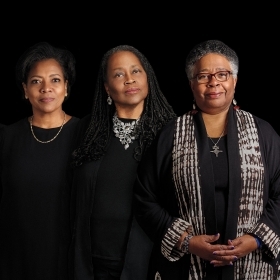

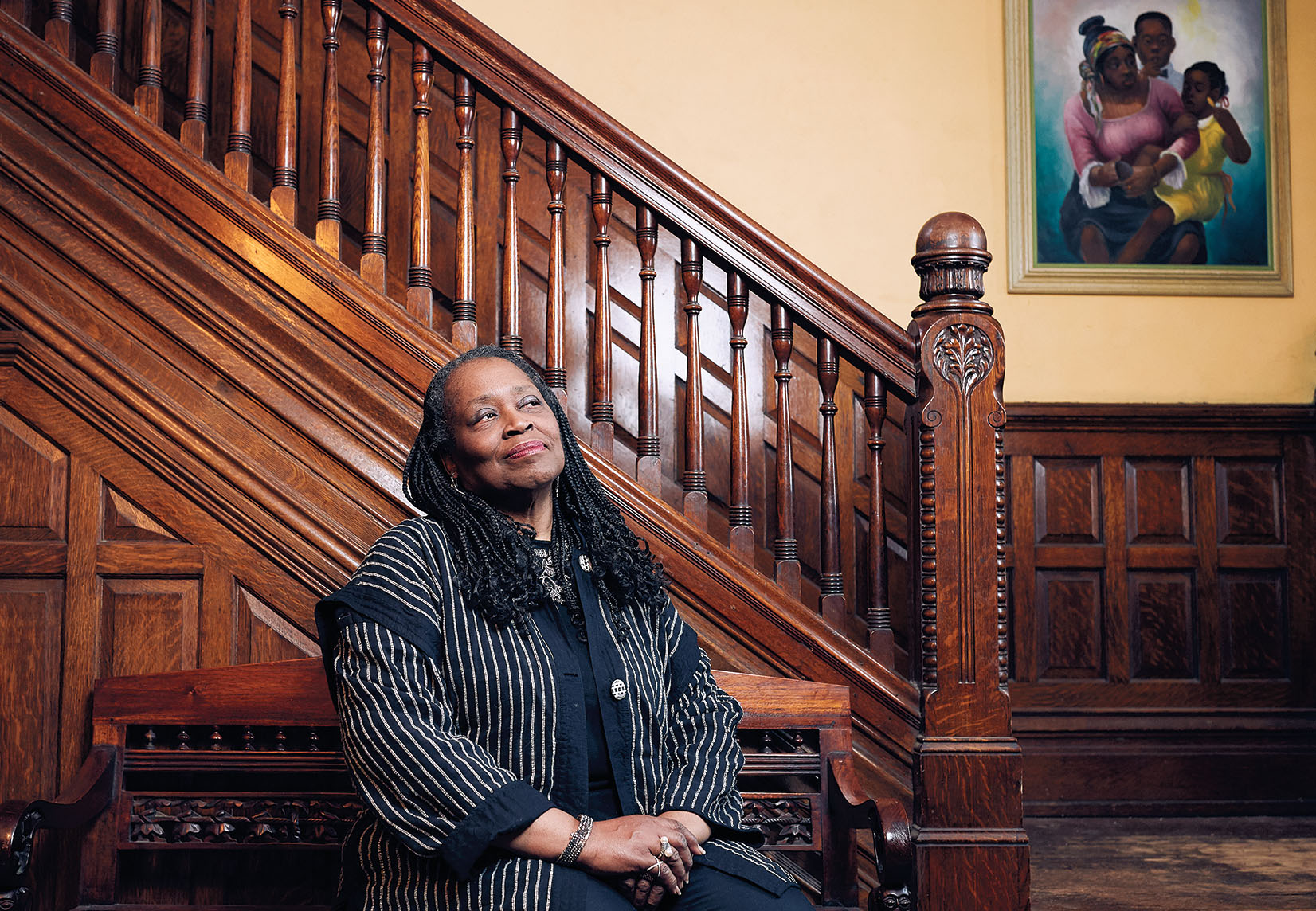
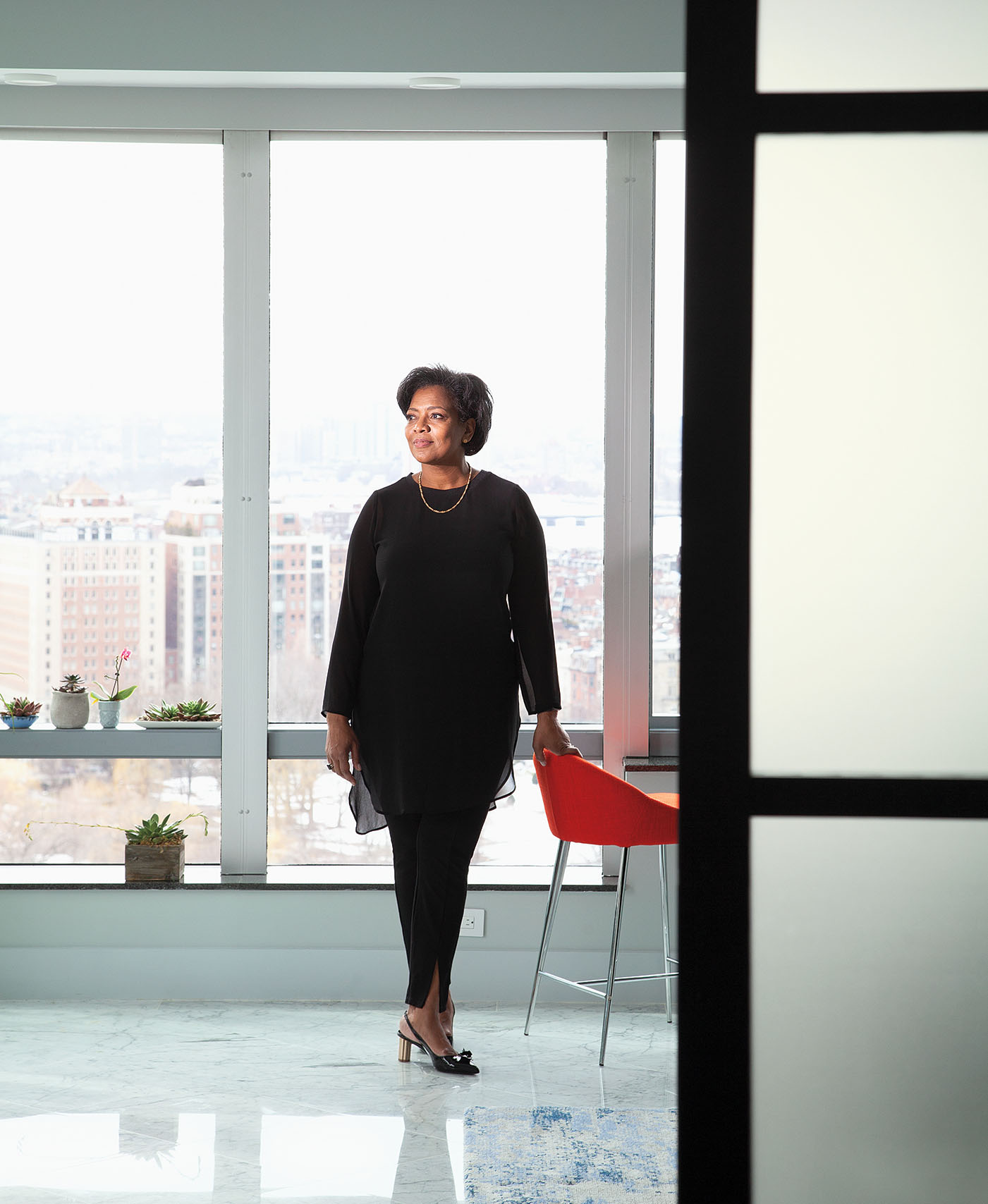
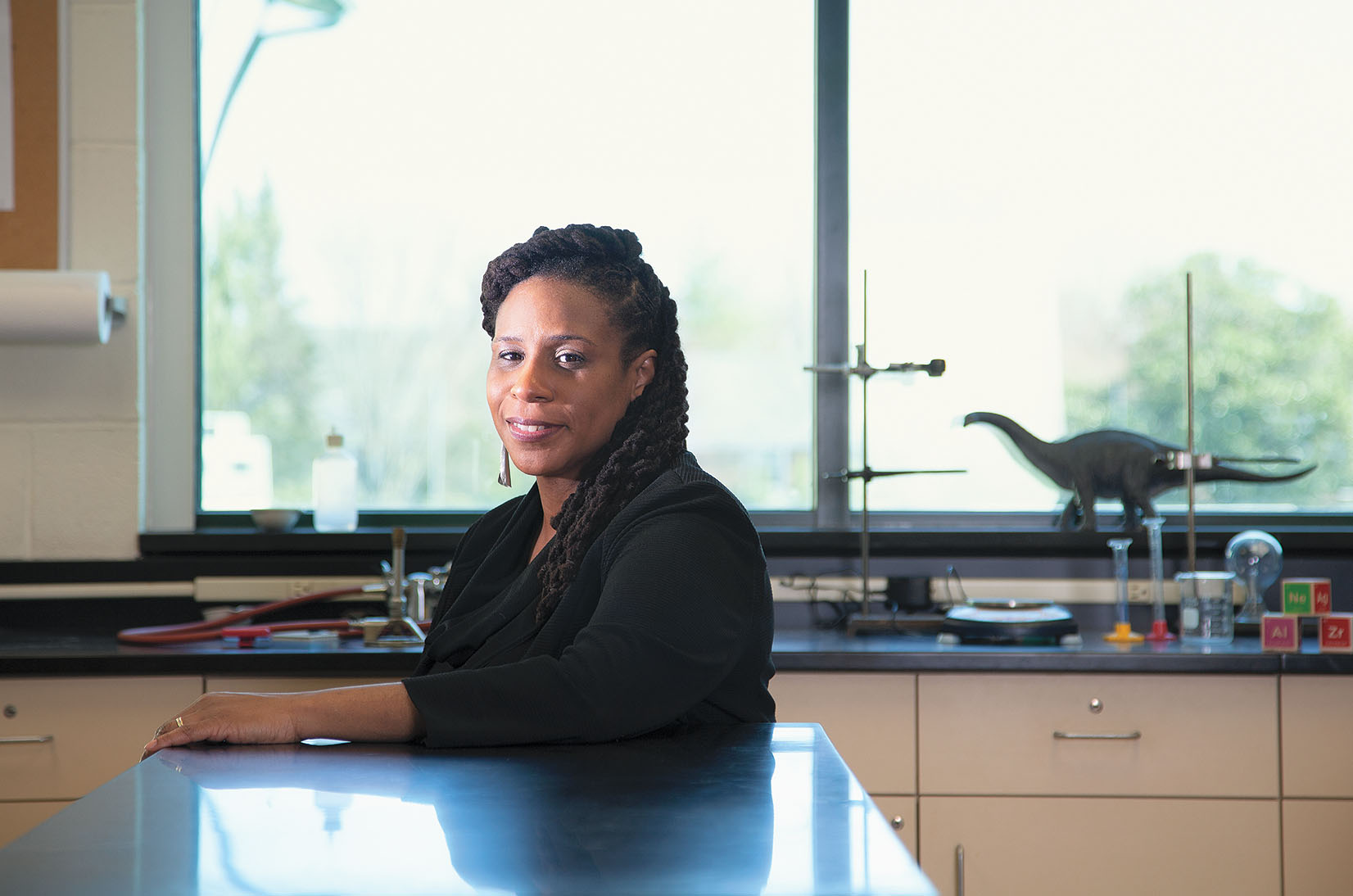


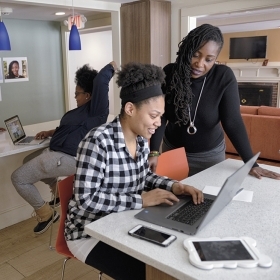
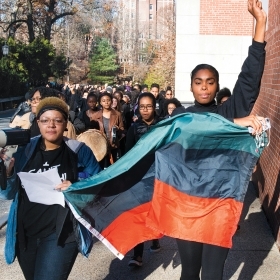
We ask that those who engage in Wellesley magazine's online community act with honesty, integrity, and respect. (Remember the honor code, alums?) We reserve the right to remove comments by impersonators or comments that are not civil and relevant to the subject at hand. By posting here, you are permitting Wellesley magazine to edit and republish your comment in all media. Please remember that all posts are public.